
Outwood Windmill is a Grade I listed post mill in Outwood, Surrey. Built in 1665 by Thomas Budgen, a miller from Nutfield in Surrey, it is Britain's oldest working windmill.
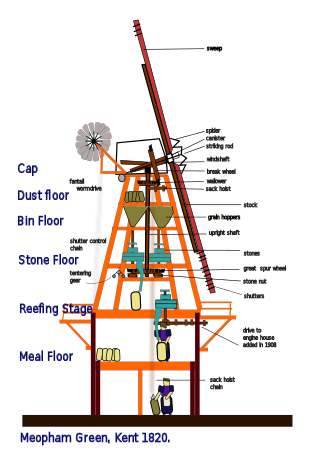
This glossary of mill machinery covers the major pieces of machinery to be found in windmills, watermills and horse mills. It does not cover machinery found in modern factories.

Halnaker Windmill is a tower mill which stands on Halnaker Hill, northeast of Chichester, Sussex, England. The mill is reached by a public footpath from the north end of Halnaker, where a track follows the line of Stane Street before turning west to the hilltop. There is no machinery in the brick tower.

Union Mill is a Grade I listed smock mill in Cranbrook, Kent, England, which has been restored to working order. It is the tallest smock mill in the United Kingdom.

Herne Windmill is a Grade I listed smock mill in Herne, Kent, England, that was built in 1789.

Draper's Windmill or Old Mill is a Grade II listed Smock mill in Margate, Kent, England that was built in 1845.

Killick's Mill is a Grade II* listed smock mill in Meopham, Kent, England that was built in 1801 and which has been restored.

New Mill is a Grade II listed smock mill in Northbourne, Kent, England that was built in 1848 and which has been converted to residential accommodation.

Lower Mill is a smock mill in Woodchurch, Kent, England that was built in 1820. It is a Scheduled Ancient Monument and a Grade II* listed building.
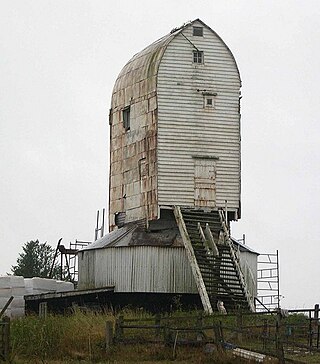
New Mill is a Grade II* listed post mill at Cross in Hand near Heathfield, East Sussex, England. It was the last windmill working commercially by wind in Sussex, ceasing work by wind in 1969 when a stock broke.
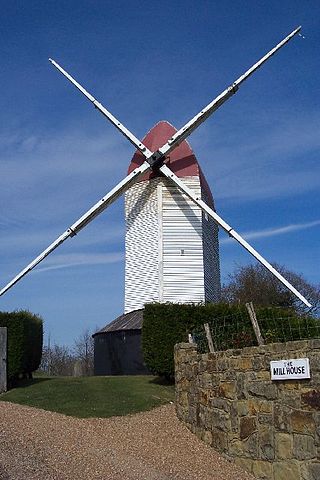
Argos Hill Mill is a grade II* listed post mill at Argos Hill, Mayfield, East Sussex, England

King's Mead Mill is a grade II listed smock mill at Battle, Sussex, England, which has been converted to residential accommodation.
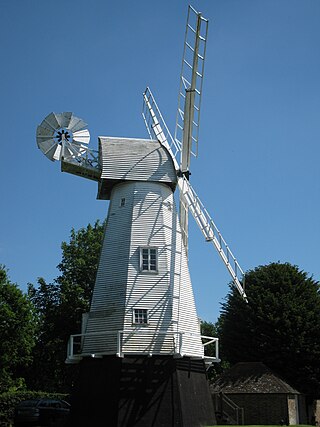
Heritage Mill, or Beard's Mill is a grade II listed smock mill at North Chailey, Sussex, England, which is maintained as a landmark and open to the public.
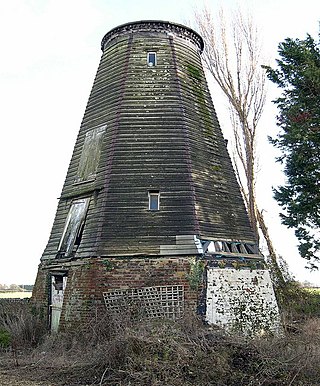
Somerley Mill is a grade II listed smock mill at Earnley, Sussex, England, which is under restoration.

Gibbet Mill, Tillingham Mill, Barry's Mill or New Mill is a grade II listed cosmetically reconstructed smock mill at Rye, East Sussex, England. Today it serves as bed and breakfast accommodation.

West Blatchington Windmill is a Grade II* listed smock mill at West Blatchington, Brighton and Hove, in the historic county of Sussex, England which has been restored and is open to the public.
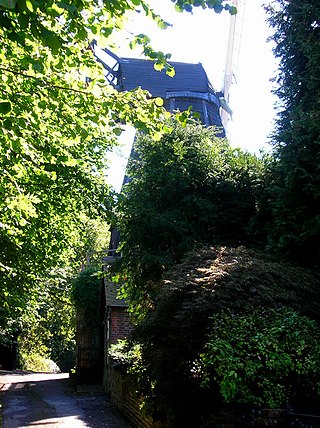
Meeten's Mill is a grade II listed smock mill at West Chiltington, Sussex, England, which has been converted to residential use.

Ovenden's Mill or Mockett's Mill is a grade II* listed tower mill at Polegate, East Sussex, England which has been restored and is open to the public.

Stone Cross Windmill is a grade II* listed tower mill at Stone Cross, East Sussex, England which has been restored and is open to the public. The mill was also known as Blackness Mill and the White Mill.

Baker Street Mill is a grade II listed smock mill at Baker Street, Orsett, Essex, England which has been part adapted to residential use on its lower two floors only.





















